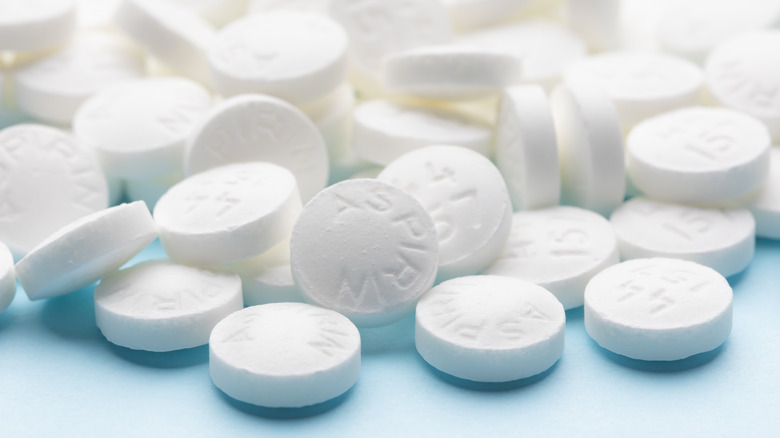Can Too Much Aspirin Be Hazardous To Your Health?
A common form of pain relief, aspirin has a wide range of uses, from the management of pain to helping to reduce the risk of heart attack or stroke (via NHS Inform). At low doses, it has an antiplatelet effect, which helps keep the blood from clotting by making it less sticky, while at higher doses, it can reduce pain and swelling and help lower a fever.
Aspirin is an over-the-counter medication and is readily available to customers who need it. Its easy accessibility makes it easy to presume that aspirin is safe to take however one pleases. However, it is still very possible to overdose on aspirin (via Healthline). According to WebMD, aspirin poisoning was once, prior to the development of child-resistant packaging, the most common cause of accidental poisoning in children. Additionally, unintentional overdoses can occur when a number of different medications with aspirin or similar substances are taken together. This tends to happen when someone is dealing with a chronic illness or ongoing health problems.
How much is too much?
According to the National Headache Institute, it would take a large dose of aspirin for someone to overdose. A 150-pound person would need to ingest more than 30 tablets to feel even mild symptoms of aspirin poisoning. Healthline notes that aspirin poisoning occurs when a person takes more of it than their body can successfully clear. The toxicity levels are weighed out by comparing milligrams of aspirin to kilograms of body weight. Your kilogram weight is arrived at by dividing your body weight in pounds by 2.2. As Healthline explains it, by that metric, a 150-pound person would weigh approximately 68 kilograms. For them, 34,000 milligrams of aspirin would be a dangerous amount.
However, there are instances of gradual aspirin poisoning, according to Merck Manual. This can happen if people continually take higher doses of aspirin over an extended period of time. This can happen with children who are suffering from a fever and who take aspirin for several days. However, no over-the-counter children's cough and cold medications currently contain aspirin.
You should not undertake a daily aspirin regimen without consulting your doctor, as daily aspirin use can lead to a number of side effects, including gastrointestinal bleeding, according to the Mayo Clinic.
What signs should you look out for?
If you've taken too much aspirin, some of the side effects, according to the National Headache Institute, include ringing in the ears and difficulty hearing, rapid breathing, hyperventilation, drowsiness, confusion, blurred vision, and difficulty communicating.
If you think that you may have had an overdose of aspirin, you should contact your doctor immediately (via Healthline). The first thing to do is to let your doctor know how much aspirin was consumed, even if it means taking empty aspirin bottles to give them a better picture. Treatment for aspirin overdose can include activated charcoal, IV fluids, or gastric lavage. This last option is only effective if it's been less than four hours since the last time you took aspirin, and involves using a tube inserted into the stomach through the nose to suction out the contents of the stomach. In extreme cases, dialysis may be needed to clean the blood of toxins. The National Headache Institute notes that, as long as you receive treatment quickly, you should be able to fully recover from aspirin toxicity.



